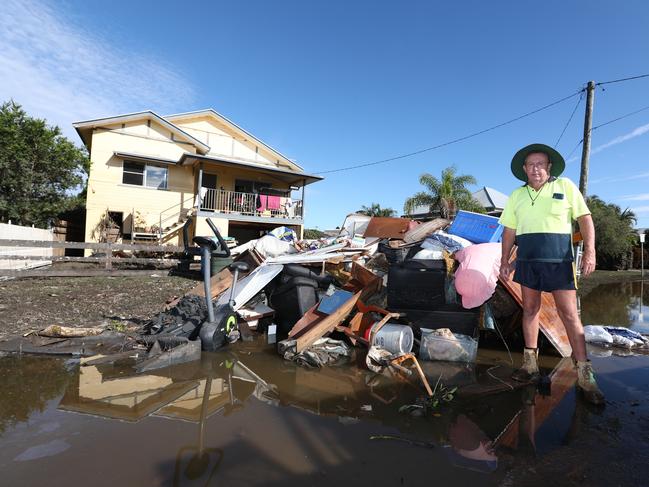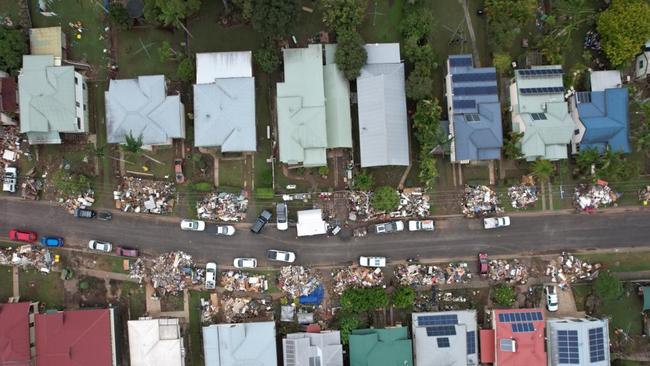Vikki Campion: It’s time for governments to stop talking and take action
It’s easy to have a strong opinion against a dam when you have a roof over your head, a hot meal and pictures of your kids because they were never washed away, writes Vikki Campion.
Opinion
Don't miss out on the headlines from Opinion. Followed categories will be added to My News.
You could see it in their hands, infected from days of wading through sludge, a soup of bacteria, sewerage and mud left by February’s floods. Numb behind a stoic front, the Woodburn man doesn’t have a warm meal or bed, he keeps working with bandaged hands, on a mountain of muddy rubbish.
Welcome mats have been replaced with Rest in Peace signs outside houses. He hears the echo of his neighbour’s final screams as waters inundated her home as he works, unable to help when she needed it.
Grief is more palpable than the stench of carcasses, a reeking reminder of inaction, rendering all the draft water strategies, the consultation processes, the matted mess of federal and state green tape knotted up into bureaucratic rat’s-tail more responsible than not.
He is focused, blessedly unaware of a culture war erupting online, in another universe to his brown-gunk landscape of bacterial infection and loss. It’s one where environmentalists are saying floods are necessary for the environment, and removing invasive species from rivers could ease them.
Those bright minds who believe digging out lantana will stop a one-in-1000 year flood were undoubtedly the same, informing the Draft North Coast Water Strategy that “discharging purified wastewater into storage” was preferred to any dam.

It was easy for academics and wilderness foundations to smash NSW Deputy Premier Paul Toole for daring to raise the issue of biodiversity offsets blowing out regional dam costs. It was easy for them to claim dams gave a “false sense of security”.
It’s easy to have a strong opinion against a dam when you have a roof over your head and a hot meal and fresh underwear and pictures of your kids when they were babies because they were never washed away.
When Governor Macquarie planned his towns, he did so with a painted watercolour of the 1809 floods, and farmers subject to inundation were given tenancy on higher land.
So how is it that planners two centuries ago had a more enlightened and humane touch than now?
They placed human life and the necessity to feed the fledgling colony above biodiversity offsets; a “houses and dams are evil, floods are ecological” mindset.
Cyclone Tracey affected an estimated 43,500 people in 12,000 dwellings, most incapable of withstanding the cyclone’s direct force, triggering our national building framework.
At least 26,000 people have lost their homes in this one-in-a-1000- year flood, which doesn’t mean they will occur once every 1000 years, but there is a 0.1 per cent chance of them happening each year.

The February floods are our Cyclone Tracey moment that requires Governor Macquarie thinking to prevent again. Floods are a perpetual feature of our landscape, so we have to build the infrastructure that accepts them. This means roads that don’t need to deal with creeks, inland rail, and dams to regulate water flow.
When Macquarie planned his towns, he predicted a flood housing crisis based on advice by way of watercolour and provided high residential allotments for those whose farms were subject to periodic inundation.
Now, we have a community that loses 95 per cent of its fresh water going out to sea, that is subject to regular floods, and told to process sewerage into drinking water, which is extremely costly and energy-intense. No one suggests dams stop flooding altogether, but flood mitigation dams do buy time to evacuate precious resources, horses, cattle, people, food, and memories to safer ground.
For the man with the bandaged hands, it could have meant he could save his neighbour. Two centuries post-Macquarie, our flood-affected communities, are arguably worse off than in the 1800s.

Their phones still don’t have coverage 10 days later. They are homeless, but not on the streets, awkwardly living in other people’s spare rooms, waiting for a rental opening that won’t come amid a national timber shortage and a three-month wait for a tradie.
Even in the homelessness crisis, a drought of telecommunications services, and overwhelming grief, academics were quick to come out and claim “floods are important to ecosystems”.
Even as studies from these same institutions that simulated floodplain dynamics showed, dams can reduce the number of people exposed to flood by 20 per cent.
Former Minister Melinda Pavey called on government departments to find what crown land away from flood plains could be used for regional housing. We are yet to see those results. This is the Macquarie-type thinking we need. He was not running off consulting with “wilderness foundations” as he built early NSW, he just did it because the colony relied upon him getting it right. Governments are now so busy consulting that nothing gets built, and ultimately, taxpayers shoulder the cost of that inaction.
Services Australia has paid nearly $200 million in disaster recovery payments, but the amount paid to genuine flood victims is unknown, as scammers in towns 200km away from a puddle, claim “furniture damage”, with $1000 per adult and $400 per child hitting bank accounts immediately. For February’s flood victims, sorry doesn’t cut it and thanks will never be enough. Words are cheap instruments used to appease environmentalist anti-dam academics. Heroes with bandaged hands don’t care about what politicians say, they continue cleaning long after the cameras are gone.





